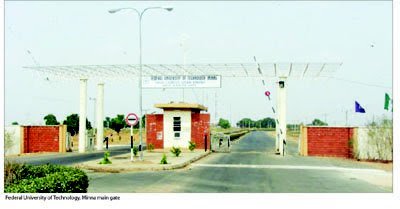The Federal University of Technology, Minna (FUTMINNA) in Niger State, has expelled a doctoral student Olateju Ademola Mukaila, for alleged plagiarism.
Three lecturers accused of complicity in the case were sanctioned. The decision did not go down well with the Academic Staff Union (ASUU), JUSTINA ASISHANA Minna reports.
The expulsion of a doctoral student of the Federal University of Technology, Minna, (FUTMINNA), Niger State is generating controversy in the university.
Olateju Adedamola Mukaila, a PhD student in the Department of Urban and Regional Planning was expelled after being accused of ‘plagiarism’. However, he was not punished alone. Three other lecturers linked to the matter served one punishment or the other.
For instance, Mukaila’s supervisor (internal) Prof Oluwole Olukanmi Morenikeji, was not only demoted, but was relieved of his position as Deputy Vice Chancellor (Academics).
Another lecturer, Dr Olatunde Adedayo, the university’s Turn-It-In officer (‘Turn It In’ is a software that detects the degree of plagiarism in a scholarly work), was also suspended, a decision which the lecturer claimed was unjust and unconstitutional as the issue was never reported to his office. Adedayo was initially demoted, but following his complaints, he was suspended. The third lecturer (who does not wish to be named), whose work Mukaila was said to have plagiarised, was dismissed. He declined to comment on the matter, saying: “I have nothing to say,” when The Nation reached out to him.
However, Adedayo appealed the Council’s decision to demote him, wondering why he had to be punished when he was the one who informed the university about the plagiarism. He claimed he was never in the picture until Mukaila’s project was brought to his notice.
“I was even the one who informed the relevant authorities on the allegation and I do not know the basis or reason why I am also affected,” he said.
Adedayo said he was invited by management as a witness. In his appeal to Council, the lecturer claimed he was neither accused of any crime nor was he asked to defend himself at any point.
“The appeal panel interacted with me via telephone because I was on national assignment then,” said the lecturer.
The teacher said he was to get the biggest shocker of his life when, after his appeal, the investigative panel constituted by the Council, not only refused to clear him, but changed the allegation and punishment against him. He had to make another appeal to prove his innocence.
Mukaila, however, is not going down without a fight. He has challenged the conviction by the university in the court of law.
The lecturer at Kano State Polytechnic is demanding N1 million as compensation from the university management.
The case, filed before the Minna High Court, is questioning the reason behind his dismissal after he had fulfilled all the requirements for graduation.
When contacted for comments on Mukaila’s dismissal, the school management said it would not speak further to avoid contempt of court.
However, regarding Adedayo, a source in the university claimed that his suspension may not be unconnected with the fact that he went on national assignment without due permission while being investigated.
Further investigation by The Nation revealed that two other lecturers who travelled with Adedayo for the same assignment did not get their approval before the trip, but they were granted leave during the trip. Not so for Adedayo, who was not given approval.
Adedayo, who spoke to our correspondent, said he had since appealed the decision to suspend him and copied relevant authorities, but was yet to get a response.
He also described himself as an upright person, who always speaks up against injustice and has been a great contributor to the positive status the institution enjoys.
The plagiarism case is raising a lot of dust in the university. The Nation learnt that this is the first case of plagiarism that has led to serious backlash on the institution. Many workers were not happy with what they described as the university’s shoddy manner of handling the matter.
On its part, the Academic Staff Union of University (ASUU) FUTMinna chapter, has accused the management of putting the union in the dark, saying it was not aware until punishment was served on its members.
Its chairman, Dr Ndamitso Mohammed, said ASUU was not invited to be part of the committee set up to investigate the case.
He said: “I started hearing about the issue as if it was not an issue at all. Some people were just hearing things like, ‘this lecturer did this, this student did that.’
“No one knew the truth about the issue. If they (management) had informed us, we would have taken action and it would not have gotten this far because in the union, an injury to one is an injury to all.”
Muhammed also bemoaned the affected members for failing to reach out to the union during their trial.
He continued: “Also as ASUU, we cannot just jump into a case. If there is such a problem, the members affected are expected to write to us that they have been victimised, but where such members did not do that, the union’s hands are tied.
“We are not aware that our members were invited to face any disciplinary committee. All we were hearing then was hearsay because there was no official complaint.”
Muhammed said it was after the management’s verdict, that the lecturers ran to the union.
“When no other members wrote, we decided to take it upon ourselves by wading into the matter. We set up a committee at the executive level and interacted with the affected members to hear their view,” he said.
Muhammed said the report of the committee was submitted to the National ASUU, which directed them to set up another committee because the previous committee had no member of the management in it.
“We have not been able to set up the committee as directed because of the ongoing ASUU strike, but once the strike is called off, we will set up the committee and see what can be done,” he said.
The union chairman said the allegations against his members were not as serious to have warranted the kind of big stick the management wielded.
“We are still finding it difficult to find out what went wrong. It is a sensitive case which many do not want to dabble into.”
Many workers approached by The Nation for comments were afraid to speak on the issue.
The few who spoke agreed on condition of anonymity. A lecturer in the Department of Architecture berated the management for taking the case too far.
“The anti-plagiarism tool is not a punitive, but a corrective measure. It aimed for originality. Even if someone is to be punished, it should be the student and not the lecturers,” the lecturer said.
According to the lecturer, Turn-It-In was adopted by FUTMINNA in 2010, but it took effect two years later. The tool, he said, is to highlight the intensity of work lifted from another work by the student and show the percentage of the plagiarised work. If more than a certain percentage, the student will have to rework to meet what is acceptable.
“Different levels of studies have its own tolerance percentage. Here, for undergraduate, it is 20 per cent or less, for Masters and PGD, it is 15 per cent or less and for PHD, it is 10 per cent or less. This student got less than 10 per cent when he did his final Turn-It-In, so you can also judge if the case is worth punishing anybody for,” he said.
Another lecturer in the Department of Biochemistry said he was surprised when he heard about the case. “Even the Turn-It-In is usually done after the external seminar and not before it. So, I do not see any case in this at all. This is just a clear case of politics in our institution,” he said.
Another source said. It is agreed that a lot of people plagarise the work of others, but they do it in a way that it fits into what they are researching, and not by writing it verbatim. The institution blamed the lecturer for not stopping the external examination, but I can tell you that the issue of plagiarism is usually not dealt with before the external examination, but after it.
“Plagiarism is not a punitive measure. I believe there are many people acting behind the scene. There is no case regarding this issue. The punishment given to the lecturers and supervisors did not equate the offence committed. The law of the university is weak and the student exploited the law. The university should have used this as a lesson towards other cases and not taking it to this extent.”
Another lecturer thought it was odd the way the case progressed saying: “The peculiar thing about this case was that they punished the staff before they punished the student and contrary to the code of service, none of the lecturers punished were issued query. They were only called as witnesses and the next thing they had was the punishment.”
However, one lecturer blamed the supervisors for not stopping the external examination when they realised the work was plagiarised.
“There are a lot of things they could have done that they did not do. Maybe that is why the institution punished them. I know the student Turn It In after the externals, but when it is clear that it is a highly plagarised work, they should have raised hiatus and they would have been vindicated.”
Repeated text messages and phone calls were made to the management of the institution to comment, but no response was got.
Several text messages sent to the Vice-Chancellor (VC), Prof Abdullahi Bala, were nor replied. At a point, the Head of Information Unit of the Institution Mrs Lydia Legbo, promised to fix an appointment between The Nation and the VC, but it never materialised.
Following three weeks of intense pressure, Mrs Legbo told The Nation that the VC said he would not speak on the issue because of the court case.
“Speaking about the case is unethical and to that effect, the VC said he will not comment on the issue,” Mrs Legbo told The Nation in a text message.
Mukaila filed the case against FUT Minna and eight other defendants, claiming he did not commit the offence under which he was being expelled. He is therefore, praying the court to declare the expulsion null and void.
Last Thursday, the case was mentioned at the Federal High Court Minna. However, the university lawyer did not show up, and the presiding judge, Justice Ali Aliyu, adjourned the matter to Monday February 4.
The case filed by Mukaila read inter alia: “A declaration that the decision to expel and the expulsion of the plaintiff from the university is fraught with manifest irregularities and an abuse of academic powers by the Senate of the first defendant.”
“The plaintiff is seeking an order of the court to set aside his expulsion, an order of the court directing the defendants to absorb the plaintiff for the purpose of completing his PhD degree and the sum of N1 million for general damages for the emotional and mental torture and injury inflicted to the feeling, dignity and pride of the plaintiff.
The plaintiff claimed that, “like any other student of the first defendant, both at undergraduate and post graduate levels are allowed to use other person’s materials and must be within the university tolerable limit of 10 per cent.
“The first defendant set maximum tolerance limit for similarity index also called ‘Turn-It -In’. PhD degree students are allowed 10 percent.
Source: The Nation








